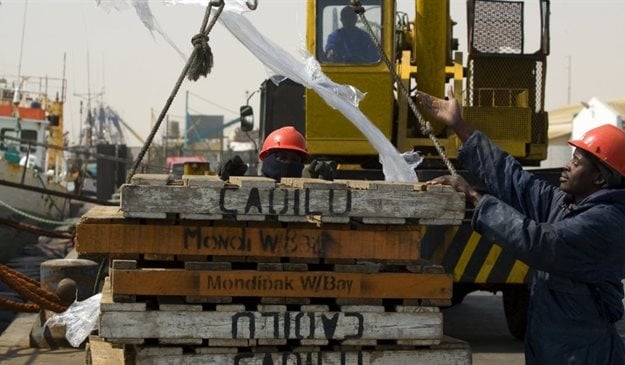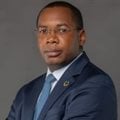Africa is cognisant of the multifaceted and multidimensional domestic and global opportunities it must harness and the challenges it must overcome to strengthen the foundations of its development.

Walvis Bay on the Atlantic Ocean is the main port in Namibia and home to many fishing companies, fishing is one of the main contributors to the Namibian economy. Cadilu is a Spanish owned company and has its processing factory on the waterside in Walvis Bay. Dock side, a fishing ship is loaded with clean containers for its next trip. © World Bank/John Hogg
African member states committed themselves to pursuing a common continental plan for the next 50 years through Agenda 2063. This is a blueprint that features an integrated approach to ensure transformation and sustainable development for future generations.
The transformative dimension of Agenda 2063 is intended to guide the actions of Africa’s stakeholders to promote the emergence of strong economies with sustainable growth and capabilities of generating wealth and decent jobs.
An alternative narrative
Agenda 2063 presents an alternative narrative on Africa’s development trajectory; explores internal and external factors that present challenges and opportunities for the people of the continent in their quest for a better life; outlines alternative policy scenarios and their projected outcomes; and considers the interface between regional and continental initiatives, while placing member states at the centre of implementation.
Taking into consideration the deep aspirations of the people is part of the agenda of the United Nations system. Since assuming his duties, UN secretary-general António Guterres has warned that despite increasing economic globalisation, “our sense of global community might be disintegrating” and that the world was suffering from a “trust deficit disorder”.
To overcome these challenges, the secretary-general pledged to “make the United Nations more effective in responding to the needs and aspirations of we the peoples” and proposed a change of paradigm to fight emerging threats such as climate change, to ensure that new technologies become a driver of peace and sustainability and “to make the international trading and financial systems fit for purpose to advance sustainable development and promote fair globalisation”.
Tanguy Gahouma-Bekale 26 Jul 2021
International cooperation falling short
The Covid-19 pandemic has brought to light the failures of the prevailing international economic system. It has proved that no country can overcome the challenges of the future on its own and that international cooperation is falling short. The pandemic has disrupted the established system and created an opportunity for change.
Despite acknowledging existing dysfunctionalities, intergovernmental discussions continue to approach issues in the same way as in the past. Covid-19 response packages mostly involve financial measures that consist of short-term patches, such as debt suspension or official development assistance (ODA) commitments that do not address the root causes of the problem. Africa continues to be depicted as a poor continent in need of help from the “international community” to build back better.
Human, socioeconomic crisis
The Covid-19 pandemic and its impact on all 17 Sustainable Development Goals (SDGs) has shown that what began as a health crisis quickly evolved into a human and socioeconomic crisis. While the crisis has derailed progress towards the SDGs, it also makes their achievement ever more urgent and necessary. It is essential that recent gains are protected as much as possible. A transformative recovery from Covid-19 should be pursued, and should address the crisis, reduce risks from future potential crises and relaunch implementation efforts to deliver the 2030 Agenda and SDGs during the Decade of Action on sustainable development.
From the foregoing, it is evident that if Africa is to realise the aspirations of its people as articulated in Agenda 2063, there is need for a new development narrative that promotes the continent’s capacity to attain Agenda 2063 and the SDGs, and strengthens Africa’s role as a significant player in the global arena.
Against this backdrop, it is imperative for Africa to be focused and strategic to recover better. The UN Office of the Special Adviser on Africa (OSAA) has embarked on a strategic agenda that identified six priorities with great potential to enhance Africa’s development. The strategic agenda is clustered around six thematic areas:
- Financing for development: Advocates for access to financing, combating illicit financial flows, enhancing international tax cooperation, engaging credit rating agencies, and reducing the cost of remittances.
- Sustainable development to promote sustainable peace: Promotes inclusive and equal institutional practices by countering conflict economies and building cohesive diverse societies as a driving force for peace.
- Governance, resilience and human capital: Encourages placing human capital at the centre of policymaking in Africa to build resilient societies.
- Science, technology and innovation: Advocates closing the gap on digital literacy and the digital divide; and tackling issues of intellectual property rights to leapfrog development.
- Industrialisation, demographic dividend, and the African Continental Free Trade Area (AfCFTA): Encourages harnessing the demographic dividend to stimulate industrialisation through the AfCFTA.
- Energy and climate action: Focuses on Africa’s energy mix, climate change and green growth, energy transition, and environmental policies.
Africa’s challenge is neither poverty nor the absence of skills, liquidity or funds to promote reconstruction and achieve sustainable development. Its problems are social, political and economic structures that drain its capacities and block the continent’s potential.
Illicit financial flows
Massive illicit financial flows are depleting Africa’s funding capacity. An unfair international financial system hinders African countries’ access to funding sources in equal conditions. The lack of ownership over natural resources prevents African countries from playing a substantive role in global value chains.
Africa suffers the consequences of a climate crisis that has been triggered by more developed nations and endures the impact of complex conflicts stemming from a myriad of historical and current socioeconomic causes.
All in all, Africa faces the challenge of promoting a change in the rules of a multilateral system that, currently, is neither fair nor equal to all. This calls for a new narrative that presents Africa as a key stakeholder with success stories and best practices to share - a narrative for Africa and from Africa in the United Nations and beyond.
Article republished courtesy of Africa Renewal.



























